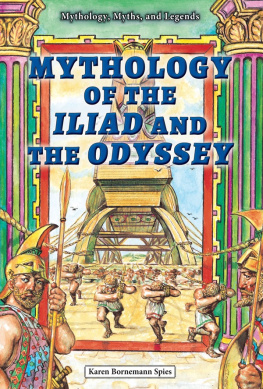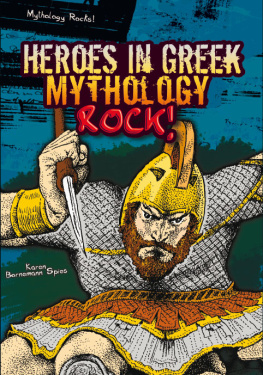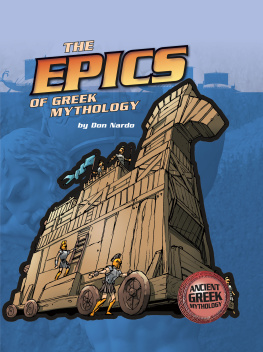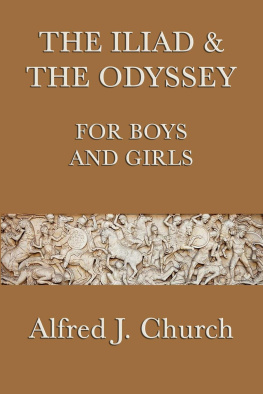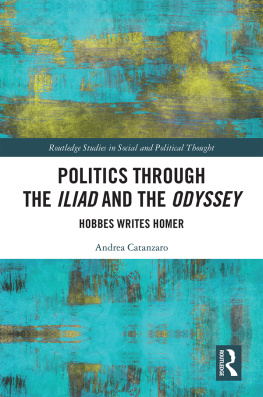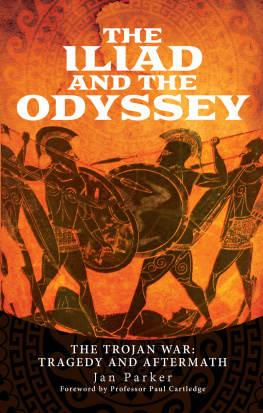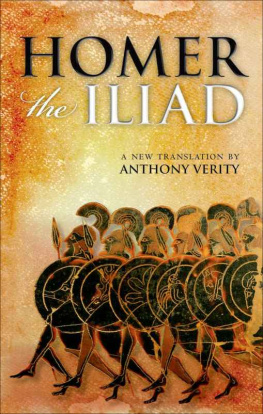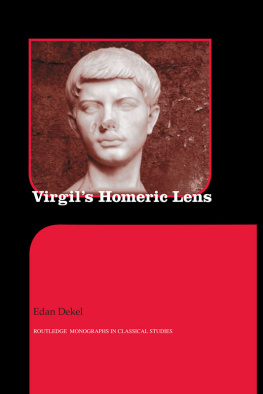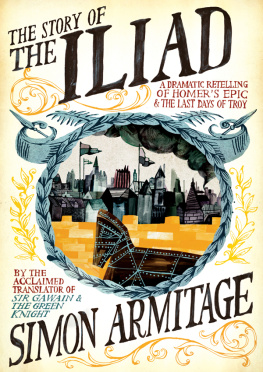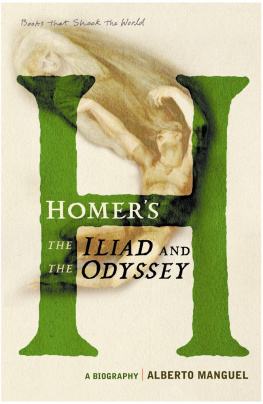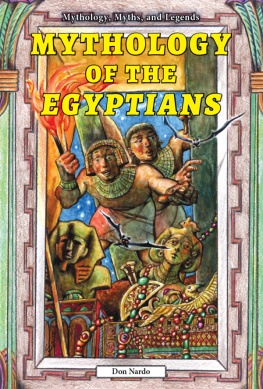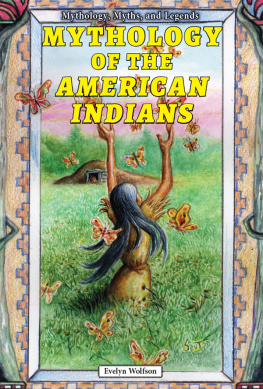Heroic Adventures
Read about the deeds of the legendary heroes and mythical gods of the Iliad and the Odyssey. Follow Odysseus as he hides in the Trojan horse and retakes Troy, fights the Cyclops, escapes enslavement by the sorceress Circe, travels to the underworld, and finally regains his wife and kingdom. Read along as Achilles battles on the plains of Troy and meets his death.
In Mythology of the Iliad and the Odyssey, author Karen Bornemann Spies details the heroic adventures in both the Iliad and the Odyssey, and includes informative interpretations, expert commentary, and a question-and-answer section.
...a worthy purchase...
VOYA
Teachers may find these volumes useful...
The Horn Book Guide
About the Author
Karen Bornemann Spies has written articles for many periodicals and is the author of Buffalo Bill Cody: Western Legend, Franklin D. Roosevelt, and Heroes in Greek Mythology Rock! for Enslow Publishers, Inc.
About the Illustrator
William Sauts Bock has illustrated many books, and his illustrations was honored by the American Institute of Graphic Arts.

People have told stories since the beginning of time. This book describes a certain type of story known as a myth. The word myth comes from the Greek word mythos, which means word, speech, or story. Myths are traditional stories handed down by word of mouth. With each retelling, they may change slightly. Eventually, many myths are written down.
The myths in this book are a special type called epics. An epic is a long poem that narrates, or tells, the deeds of a hero or heroes. An epic uses elegant, formal language to tell of the bravery and mighty deeds of these heroes. However, an epic is more than just an entertaining tale of heroes and heroic deeds. An epic also describes the ideals of a culture at an important time in its history. Details of an epic may have a foundation in historical fact.
The epics in this book are based on the Iliad and the Odyssey. The poet Homer is commonly believed to have composed both poems in the late eighth or early seventh century B.C., even though no historical proof of his authorship exists. It is traditionally believed that Homer was born in the eighth century B.C. on Chios, an island in eastern Greece, or in Smyrna, a seaport in what is now western Turkey. The Greeks believed that he was a professional poet, and that he was blind. Both epic poems describe legendary events that the Greeks believed took place centuries before the poems were composed. This period was known as the age of heroes. Homer wrote about the heroes and heroines of the Iliad and the Odyssey as a race of stronger and braver people than the Greeks of his day.
The Iliad recounts the story of the Trojan War, which may actually have taken place in about 1250 B.C. Supposedly, the Greeks united under King Agamemnon of Mycenae in order to rescue Helen, the wife of his brother, King Menelaus of Sparta. The Trojan prince Paris had kidnapped Helen and taken her to Troy, a city in the western part of Asia Minor. The Odyssey describes the journey of the hero Odysseus after the end of the Trojan War. He encountered so many obstacles and adventures that it took him ten years to return to his home on the island of Ithaca, located off the western coast of mainland Greece. Many scholars thus consider the Iliad a poem about war and the Odyssey a postwar poem.
These epics are important because they explore many universal concepts such as heroism. By reading these epics, we can learn how Greek ideals influenced other civilizations and their literature. Familiarity with these myths also helps us to understand many modern references described later in the book, such as Achilles heel and the Trojan horse.
In this book, all references to the Iliad and the Odyssey are from the Robert Fagles translations listed in Further Reading. The first number refers to the book, or chapter, in the Iliad or Odyssey from which the quote is taken, followed by a period, and then the line number(s).
Ancient Greece was composed of the mainland and several surrounding islands, including Crete and Sicily. The mainland was located on the European continent east of Italy on the Mediterranean Sea. The Peloponnesus, a southern peninsula, was connected to the mainland by an isthmus near the ancient city of Corinth. Greek warriors in the Iliad came from cities in the Peloponnesus such as Mycenae, Sparta, Tiryns, Argos, and Pylos. Archaeologists have found evidence at these cities which supports Greek mythology about the kings who lived there, and have also found the remains of the magnificent palaces in which they dwelled.
Troy was situated in Asia Minor near the mouth of the Hellespont, or Dardanelles, the waterway connecting Europe and Asia. This location allowed Troy to control much of the shipping in the ancient world. It is possible that the Greeks and Trojans fought the Trojan War over control of these shipping lanes. At the site of Troy, archaeologists have found evidence of several ruined cities, each one built atop the next. One was destroyed between 1250 and 1200 B.C., the period when the Trojan War supposedly took place. Unfortunately, it is not possible to determine if the city was destroyed by Greek invaders, an earthquake, or both. However, the presence of a number of cities at the same site is evidence that Troy commanded an important position.
In the Odyssey, Odysseus visits various mythical locations. However, his island home of Ithaca may have been the present-day island of the same name. Modern Ithaca is located in western Greece in the chain of Ionian Islands. It, like the Ithaca described in the Odyssey, is mountainous. It also has many archaeological relics of the time period of the Trojan War, so it may very well have been the site of the legendary kingdom of Odysseus.
Thousands of years ago, the Greeks had already gained fame as great seafarers who sailed throughout the Mediterranean. They carried on international trade in Asia Minor and Africa, Europe and the Middle East. Because of this, people from a variety of different backgrounds shared their myths with these Greek sailors. Many of the Greek myths we know today were adaptations of stories that the Greeks gleaned from these other cultures. The far-reaching voyages of the early Greeks help to explain the existence of different versions of each myth, and why the myths of many different cultures often resemble each other.
The history of ancient Greece influenced the development of the Iliad and the Odyssey, as well as Greek mythology as a whole. The earliest peoples migrated to the Greek mainland about 50,000 years ago from southwest Asia and from Africa. Little is known about the region until about 3000 B.C. The people, who lived in small villages, used bronze tools for farming and herding animals. They also used wheeled vehicles for transport.
In about 2000 B.C., tribes from the east came across Asia and built fortified towns on mainland Greece, where they subsisted by farming. At the same time, a powerful civilization developed on Crete. These people were known as the Minoans, after their king, Minos. The Minoans established a palatial civilization. Each palace was surrounded by homes for less wealthy people. The Minoans created a powerful seagoing empire and traded with cities on the other islands in the Aegean Sea, as well as with Sicily, Egypt, and cities on the eastern coast of the Mediterranean. The Minoan civilization was known for its international trade, sophisticated art, and fabulous wealth.

